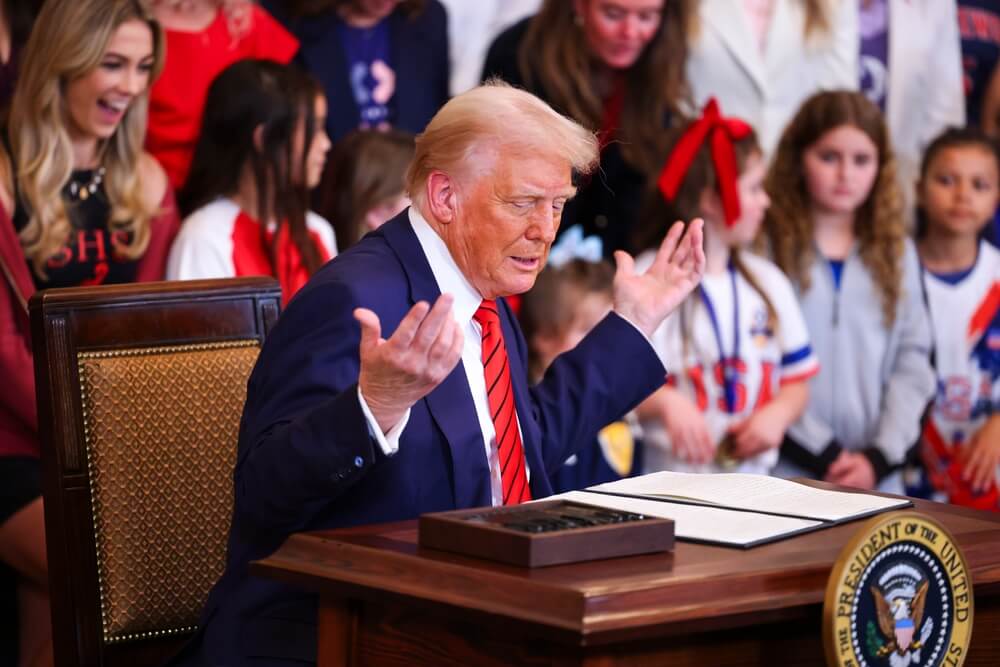Syria’s new flag was raised at the UN’s New York headquarters last week in a potent symbol of the transition to post-Assad rule by former rebel groups. But they still face a highly fragile political and economic situation almost five months after the fall of the dictator.
For the war-torn country to build a successful future, the lifting of US and other sanctions will be key, and so eyes will turn to a reportedly planned meeting of Trump and Syrian President Ahmed al-Sharaa in Saudi Arabia next month.
But will Donald Trump act to lift US sanctions, one of the major hurdles to Syrian reconstruction and renewal?
Political and ethnic tensions are running high in Syria, where 70% of the population still needs humanitarian aid and more than half face food insecurity, says the UN.
Other countries have moved to help. Saudi Arabia and Qatar announced earlier this week they will pay Syria’s outstanding $15 million debt to the World Bank, paving the way for the multilateral institution to resume lending. Qatar also began supplying Syria with natural gas through Jordan last month.
The EU and UK have started lifting some of their sanctions, including on energy, banking and some government departments, proceeding cautiously as they assess Al-Sharaa’s moves towards democratising his Hayat Tahrir al-Sham (HTS) group, which remains a US-designated terrorist organisation.
The US has only issued a six-month exemption for some sanctions to allow humanitarian aid.
Fulfilling the conditions
If Washington continues to move slowly, not only will Syria’s future remain rocky, but unrest could provide an opening to Iran, Russia and China, warned senators from Trump’s Republican Party earlier this year.
Two Republican representatives, Marlin Stutzman and Cory Mills, were the first US congressmen to visit post-Assad Syria and met Al-Sharaa in Damascus earlier this month. They sounded quite warm about him in contrast with the official US position.
“I went with an open mind and also one that was very skeptical of the new president, given his past. But after leaving, I feel like… we should seriously have a dialogue,” Stutzman told The Times of Israel this week.
The Trump administration has imposed several conditions on Syria before it lifts sanctions
The Trump administration has imposed several conditions on Syria before it lifts sanctions, including preventing Iran and its militias from operating on Syrian territory.
Syria says it has acted on most of these conditions, but on others, such as allowing the US to carry out strikes against terrorist targets, it needs “mutual understandings” with Washington, according to a letter sent by Syria, Reuters reported this week.
So far, the Trump administration's stance on Syria “lacks foresight”, says the Atlantic Council think tank. “By lifting sanctions and tariffs and encouraging private investments into the Syrian economy, the United States could offer Damascus a compelling alternative to Chinese and Russian partnerships,” it says.
Turkish and Israeli interference
Managing Turkish and Israeli interference and interests in Syria will also require much manoeuvring by Washington, but Trump may focus more on a planned withdrawal of US troops from Syria by the end of the year.
“Israel remains the most destabilising foreign power [in Syria],” according to the International Crisis Group (ICG). Israeli officials have been asking the Trump administration to keep Syrian sanctions and foreign terrorist designations in place.
An Israeli government committee, meanwhile, says it is possible that the Syrian government could become a “proxy” of Ankara given Turkey’s support and sway over HTS.
Israel is offering itself as a protector of the Druze, but many of them have denounced what they call foreign meddling
“If Israel does not modify its approach to post-Assad Syria, it risks turning a state that seems ready for accommodation into an adversary that could adopt a more vocal stance against its actions,” says the ICG.
Israel launched fresh air strikes on Syria this week and has threatened to hit government forces if they fail to end clashes between pro-government fighters and those of the Druze minority. Israel is offering itself as a protector of the Druze, but many of them have denounced what they call foreign meddling.
Minority groups
Any stabilisation of Syria requires that its multiple minority groups are represented, but HTS retained the most powerful posts in a new cabinet formed by Al-Sharaa on 29 March, and there is disgruntlement among the Druze as well as the Alawites, Kurds and Christians.
 Reconstruction, and peace itself, may hinge on what Trump decides on sanctions in the next few months as well as his management of Israeli and Turkish actions in Syria.
Reconstruction, and peace itself, may hinge on what Trump decides on sanctions in the next few months as well as his management of Israeli and Turkish actions in Syria.
An interim constitutional declaration signed by Al-Sharaa last month kept Syria’s name as the Syrian Arab Republic, made Arabic the sole official language and required that the president be Muslim.
Thousands of Alawites have been reportedly forced from their private homes by Syrian security forces in recent months. More than 1,000 civilians were killed over days of clashes between Sunnis and Alawites last month. This week, at least 39 people were killed in clashes between Sunnis and Druze.
The Kurdish-led Syrian Democratic Forces have agreed to integrate its military under government control, but Al Sharaa has rejected their call for federalism. Turkish President Recep Tayyip Erdogan this week called Kurdish calls for decentralisation “nothing more than a dream.”
Rebuilding Syria could cost around $400 billion, given the scale of destruction inflicted during the civil war that started in 2011. But reconstruction, and peace itself, may hinge on what Trump decides on sanctions in the next few months as well as his management of Israeli and Turkish actions in Syria.